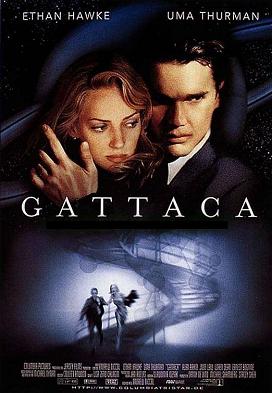 Gattaca is one of my all-time favorite flicks.
Gattaca is one of my all-time favorite flicks.
It is not new — it came out in 1997 — and yet it remains, I think, one of the most underrated movies ever.
It was written and directed by the New Zealand born auteur Andrew Niccol, who, before and after Gattaca, has been inexplicably silent.
It stars Ethan Hawke, Uma Thurman and Jude Law. (Ultra-leftwinger Gore Vidal [RIP] plays an apt supporting role.)
In 1997, Gattaca was nominated for an Academy Award: Best Set Decoration.
Gattaca — the title of which is based on the initial letters of the four DNA nitrogenous bases (guanine, adenine, thymine, cytosine, guanine) — is set in the near future.
It is a slightly cyberpunk, highly biopunk thriller that presents a vision of society driven by liberal eugenics.
Vincent Freeman, played by Ethan Hawke, is an imperfect man who desires to travel to the stars. But given his genetic make-up (he’s born with congenital heart condition), society, led by an elite bureau of planners called Gattaca Corp, has deemed Vincent “unsuitable.” He has therefore been relegated to the status of “underclass,” one of those human beings useful only for menial work. And yet not disclosed in his DNA is the fact Vincent’s will is unbreakable.
Thus he assumes a fraudulent identity: the identity of one Jerome Morrow. The real Jerome Morrow (played brilliantly by Jude Law) is a perfect genetic specimen who as a result of a botched suicide attempt is a paraplegic. The two of them, learning among other things how to deceive DNA sample testing, conspire to send Vincent on a space trip to one of Saturn’s moons. They succeed at passing one genetic test after another, using samples of the real Jerome’s hair, skin, blood and urine. Ultimately, a colleague of Vincent’s (A.K.A. Jerome Morrow) is killed, and so Vincent is at long last scheduled for his space mission. At which point, however, another colleague begins to suspect Vincent’s true origins, and the police investigate.
Vincent, understand, is one of the last “natural” babies. He is myopic and his DNA says that he is likely to die at age 30. He has an estranged younger brother named Anton (played by Loren Dean), who is now a police detective pitted against Vincent. For me, the most moving moments in this very moving movie are the swimming contests — one told in flashback, when the two brothers are young, and one in the present — and when, afterward, Anton asks Vincent how as a genetically deficient human being, he nevertheless won the swimming contests, Vincent answers that he won because he didn’t save his strength for the swim back, since he was always willing to risk everything to succeed…
Gattaca is a timeless movie — timeless, I say, because it is a profound testament to the human spirit and to that fundamental act of will which we each possess, and which each individual alone can choose to activate, or not.
It is a movie that hammers home the devastating truth that we are each the shapers of our own clay.
